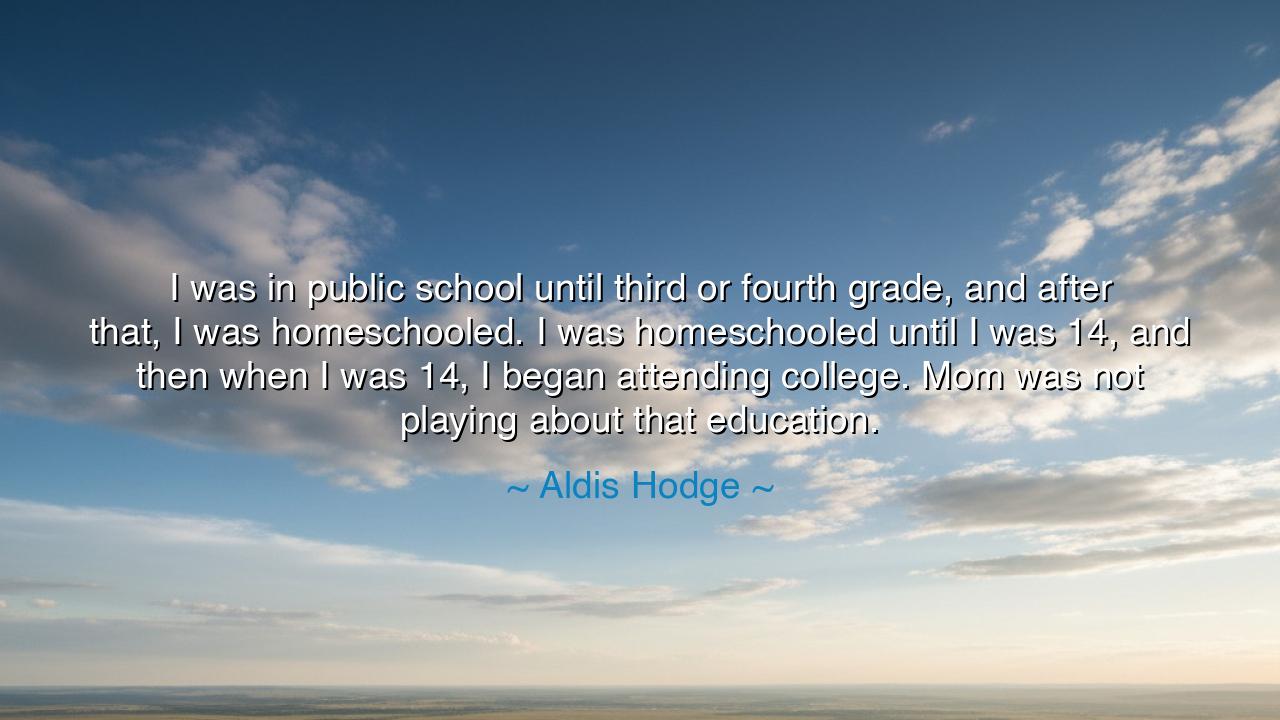
I was in public school until third or fourth grade, and after
I was in public school until third or fourth grade, and after that, I was homeschooled. I was homeschooled until I was 14, and then when I was 14, I began attending college. Mom was not playing about that education.






Aldis Hodge, the actor and craftsman of many talents, once revealed the roots of his strength with these words: “I was in public school until third or fourth grade, and after that, I was homeschooled. I was homeschooled until I was 14, and then when I was 14, I began attending college. Mom was not playing about that education.” These words, though spoken with humility and a touch of humor, conceal within them a deep teaching about discipline, sacrifice, and the power of family to shape destiny.
At the heart of this quote is the recognition that education is not simply a system, nor a building, nor a government program—it is the living fire passed down from one generation to the next. The mention of his mother strikes like a drumbeat, for it was she who bore the weight of responsibility. She became the teacher, the mentor, the guardian of the flame. This is the first wisdom we draw: that the home itself can be a sanctuary of learning, and that the zeal of one devoted parent can shape the path of greatness.
The choice of homeschooling was not an escape, but an elevation. It shows us that education does not always follow the crowded halls of public schools, but can thrive in the quiet of a kitchen table, in the disciplined hours of study, and in the fierce love of a parent who refuses to let their child drift. In Hodge’s story, the home became a temple of learning, and the mother a high priestess of wisdom. This is the ancient rhythm of humanity, for long before schools were built, it was mothers and fathers who taught survival, craft, virtue, and the art of life.
Consider the story of Thomas Edison, who as a boy struggled in formal schools and was thought to be slow. It was his mother who withdrew him, nurtured him, and guided his learning with patience and faith. From the seed of that private instruction grew the mind that lit the world with the electric lamp. Both Edison and Hodge are proof that a determined parent, armed with love and vision, can outmatch the failures of rigid systems and awaken the genius within the child.
The leap to college at 14 reveals the fruit of this labor. It is not simply a tale of early achievement, but a testament to discipline and sacrifice. The child who enters higher learning at such a tender age is not merely gifted by nature, but honed by years of patient preparation. This shows us that greatness is rarely accidental; it is built step by step, often through unseen hours of struggle, correction, and perseverance. Such discipline may appear harsh, but it is in truth a gift, for it grants the child the ability to soar higher and earlier than the world expects.
And what lesson does this quote carry for us? It is this: never take education lightly. Whether through schools, through self-study, or through the devotion of parents, knowledge is the foundation of freedom. Parents, do not abandon your role to systems alone; your influence can ignite the flame that no institution can extinguish. Children, do not despise the rigor demanded of you; behind it lies the preparation for strength and greatness.
Practical action follows naturally: guard the hours of study as sacred. Read widely, question deeply, and use every resource given to you, whether it be a library, a mentor, or the guiding hand of a parent. Parents, be vigilant as Hodge’s mother was—know that your care can place your children years ahead on their journey. And above all, remember that education is not about speed, but about depth; not about pride, but about building the tools with which to carve a meaningful life.
Thus, let us remember Aldis Hodge’s words not as a mere story of personal success, but as an eternal teaching: that when education is honored, when parents refuse to relent, when children embrace discipline, then even the walls of limitation crumble, and new horizons open. For knowledge is the weapon, and wisdom the shield, by which destiny is secured.






AAdministratorAdministrator
Welcome, honored guests. Please leave a comment, we will respond soon